(完整版)动词不定式用法小结
- 格式:doc
- 大小:40.51 KB
- 文档页数:4
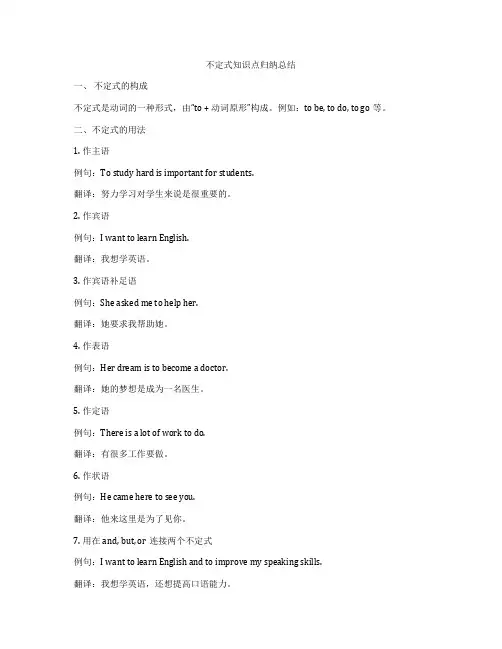
不定式知识点归纳总结一、不定式的构成不定式是动词的一种形式,由“to + 动词原形”构成。
例如:to be, to do, to go等。
二、不定式的用法1. 作主语例句:To study hard is important for students.翻译:努力学习对学生来说是很重要的。
2. 作宾语例句:I want to learn English.翻译:我想学英语。
3. 作宾语补足语例句:She asked me to help her.翻译:她要求我帮助她。
4. 作表语例句:Her dream is to become a doctor.翻译:她的梦想是成为一名医生。
5. 作定语例句:There is a lot of work to do.翻译:有很多工作要做。
6. 作状语例句:He came here to see you.翻译:他来这里是为了见你。
7. 用在and, but, or连接两个不定式例句:I want to learn English and to improve my speaking skills.翻译:我想学英语,还想提高口语能力。
8. 与形容词和副词连用例句:I'm happy to meet you.翻译:见到你我很高兴。
9. 用在名词前表示目的,结果等例句:He gave us some advice to help us study better. 翻译:他给了我们一些建议,帮助我们更好地学习。
三、不定式的特殊用法1. with + 宾语 + 不定式例句:He left me with nothing to say.翻译:他让我无话可说。
2. for + 宾语 + to 不定式例句:We have a lot of work for you to do.翻译:我们有很多工作需要你做。
3. 不定式的被动形式例句:The book is difficult to finish.翻译:这本书难以完成。
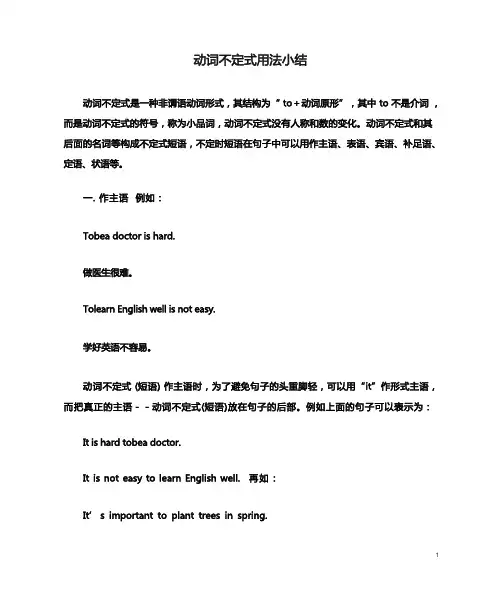
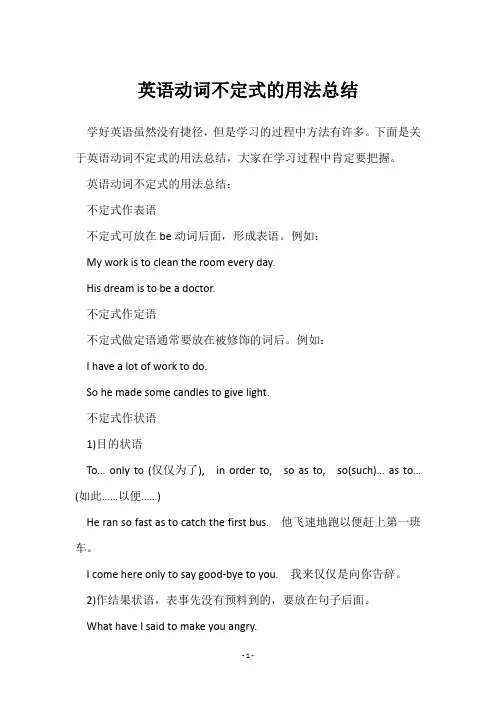
英语动词不定式的用法总结学好英语虽然没有捷径,但是学习的过程中方法有许多。
下面是关于英语动词不定式的用法总结,大家在学习过程中肯定要把握。
英语动词不定式的用法总结:不定式作表语不定式可放在be动词后面,形成表语。
例如:My work is to clean the room every day.His dream is to be a doctor.不定式作定语不定式做定语通常要放在被修饰的词后。
例如:I have a lot of work to do.So he made some candles to give light.不定式作状语1)目的状语To… only to (仅仅为了),in order to,so as to,so(such)… as to… (如此……以便……)He ran so fast as to catch the first bus.他飞速地跑以便赶上第一班车。
I come here only to say good-bye to you.我来仅仅是向你告辞。
2)作结果状语,表事先没有预料到的,要放在句子后面。
What have I said to make you angry.He searched the room only to find nothing.3)表缘由I’m glad to see you.典型例题The chair looks rather hard, but in fact it is very comfortable to ___.A. sitB. sit onC. be seatD. be sat on答案:B.假如不定式为不及物动词,其后应有必要的介词。
当动词与介词连用时,常位于"形容词+动词不定式"结构的末尾。
以上就是英语动词不定式的用法总结,盼望可以给大家学习带来关心。
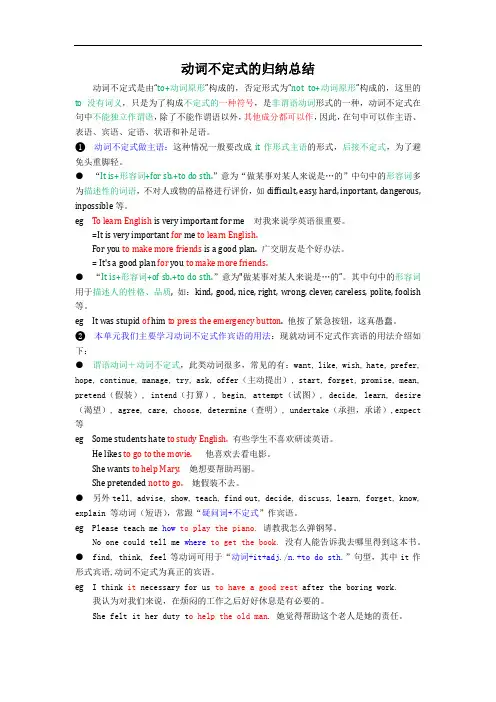
动词不定式的归纳总结动词不定式是由“to+动词原形”构成的,否定形式为“not to+动词原形”构成的,这里的to没有词义,只是为了构成不定式的一种符号,是非谓语动词形式的一种,动词不定式在句中不能独立作谓语,除了不能作谓语以外,其他成分都可以作,因此,在句中可以作主语、表语、宾语、定语、状语和补足语。
❶ 动词不定式做主语:这种情况一般要改成it作形式主语的形式,后接不定式,为了避免头重脚轻。
●“It is+形容词+for sb.+to do sth.”意为“做某事对某人来说是…的”中句中的形容词多为描述性的词语,不对人或物的品格进行评价,如difficult, easy, hard, inportant, dangerous, inpossible等。
eg To learn English is very important for me 对我来说学英语很重要。
=It is very important for me to learn English.For you to make more friends is a good plan. 广交朋友是个好办法。
= It's a good plan for you to make more friends.●“It is+形容词+of sb.+to do sth.”意为"做某事对某人来说是…的”。
其中句中的形容词用于描述人的性格、品质, 如:kind, good, nice, right, wrong, clever, careless, polite, foolish 等。
eg It was stupid of him to press the emergency button. 他按了紧急按钮,这真愚蠢。
❷ 本单元我们主要学习动词不定式作宾语的用法:现就动词不定式作宾语的用法介绍如下:●谓语动词+动词不定式,此类动词很多,常见的有:want, like, wish, hate, prefer, hope, continue, manage, try, ask, offer(主动提出), start, forget, promise, mean, pretend(假装), intend(打算), begin, attempt(试图), decide, learn, desire (渴望), agree, care, choose, determine(查明), undertake(承担,承诺),expect 等eg Some students hate to study English. 有些学生不喜欢研读英语。
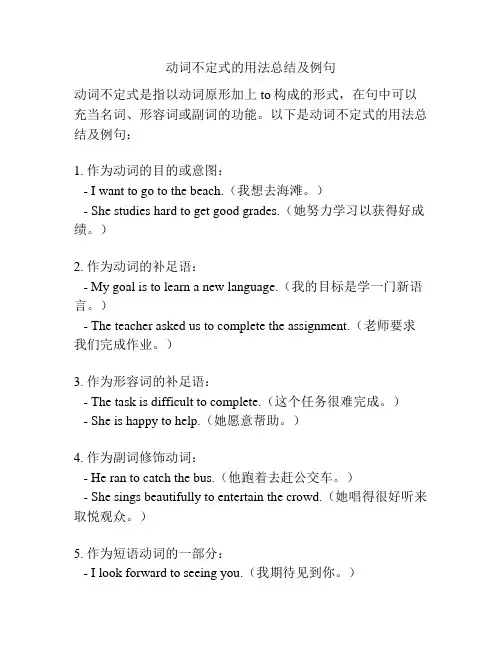
动词不定式的用法总结及例句动词不定式是指以动词原形加上to构成的形式,在句中可以充当名词、形容词或副词的功能。
以下是动词不定式的用法总结及例句:1. 作为动词的目的或意图:- I want to go to the beach.(我想去海滩。
)- She studies hard to get good grades.(她努力学习以获得好成绩。
)2. 作为动词的补足语:- My goal is to learn a new language.(我的目标是学一门新语言。
)- The teacher asked us to complete the assignment.(老师要求我们完成作业。
)3. 作为形容词的补足语:- The task is difficult to complete.(这个任务很难完成。
)- She is happy to help.(她愿意帮助。
)4. 作为副词修饰动词:- He ran to catch the bus.(他跑着去赶公交车。
)- She sings beautifully to entertain the crowd.(她唱得很好听来取悦观众。
)5. 作为短语动词的一部分:- I look forward to seeing you.(我期待见到你。
)- He decided to give up smoking.(他决定戒烟。
)6. 作为动词的主语:- To live a healthy lifestyle is important.(过健康的生活方式很重要。
)- To travel the world is his dream.(环游世界是他的梦想。
)7. 作为动词的宾语:- I like to read novels.(我喜欢读小说。
)- They want to visit their grandparents.(他们想去拜访祖父母。
)需要注意的是,动词不定式在句中的位置可以灵活变化,但通常放在动词之后、名词之前、或者作为句子的结尾。
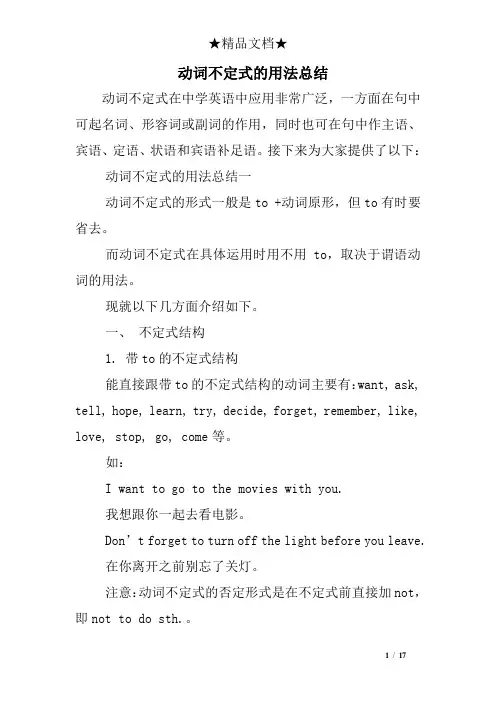
动词不定式的用法总结动词不定式在中学英语中应用非常广泛,一方面在句中可起名词、形容词或副词的作用,同时也可在句中作主语、宾语、定语、状语和宾语补足语。
接下来为大家提供了以下:动词不定式的用法总结一动词不定式的形式一般是to +动词原形,但to有时要省去。
而动词不定式在具体运用时用不用to,取决于谓语动词的用法。
现就以下几方面介绍如下。
一、不定式结构1. 带to的不定式结构能直接跟带to的不定式结构的动词主要有:want, ask, tell, hope, learn, try, decide, forget, remember, like, love, stop, go, come等。
如:I want to go to the movies with you.我想跟你一起去看电影。
Don’t forget to turn off the light before you leave.在你离开之前别忘了关灯。
注意:动词不定式的否定形式是在不定式前直接加not,即not to do sth.。
如:Dave told me not to wake up Kate.大卫告诉我别叫醒凯特。
2. 不带to的不定式结构以下几种情况使用不带to的动词不定式:(1)在固定词组had better之后。
注意:had better的否定形式是had better not do sth.。
如:You had better go home now.你最好现在回家。
It’s cold outside. You’d better not go out.外面很冷,你最好不要出去。
(2)在let, make, see, feel, watch, hear等感官或使役动词后,要跟不带to的动词不定式作宾语补足语。
如:I made them give me the money back.我迫使他们把钱还给我。
I didn’t see you come in.我没看见你进来。
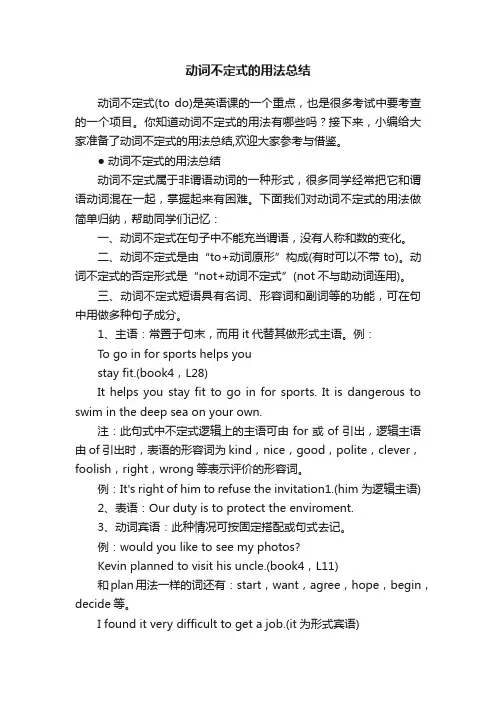
动词不定式的用法总结动词不定式(to do)是英语课的一个重点,也是很多考试中要考查的一个项目。
你知道动词不定式的用法有哪些吗?接下来,小编给大家准备了动词不定式的用法总结,欢迎大家参考与借鉴。
●动词不定式的用法总结动词不定式属于非谓语动词的一种形式,很多同学经常把它和谓语动词混在一起,掌握起来有困难。
下面我们对动词不定式的用法做简单归纳,帮助同学们记忆:一、动词不定式在句子中不能充当谓语,没有人称和数的变化。
二、动词不定式是由“to+动词原形”构成(有时可以不带to)。
动词不定式的否定形式是“not+动词不定式”(not不与助动词连用)。
三、动词不定式短语具有名词、形容词和副词等的功能,可在句中用做多种句子成分。
1、主语:常置于句末,而用it代替其做形式主语。
例:To go in for sports helps youstay fit.(book4,L28)It helps you stay fit to go in for sports. It is dangerous to swim in the deep sea on your own.注:此句式中不定式逻辑上的主语可由for或of引出,逻辑主语由of引出时,表语的形容词为kind,nice,good,polite,clever,foolish,right,wrong等表示评价的形容词。
例:It's right of him to refuse the invitation1.(him为逻辑主语)2、表语:Our duty is to protect the enviroment.3、动词宾语:此种情况可按固定搭配或句式去记。
例:would you like to see my photos?Kevin planned to visit his uncle.(book4,L11)和plan用法一样的词还有:start,want,agree,hope,begin,decide等。
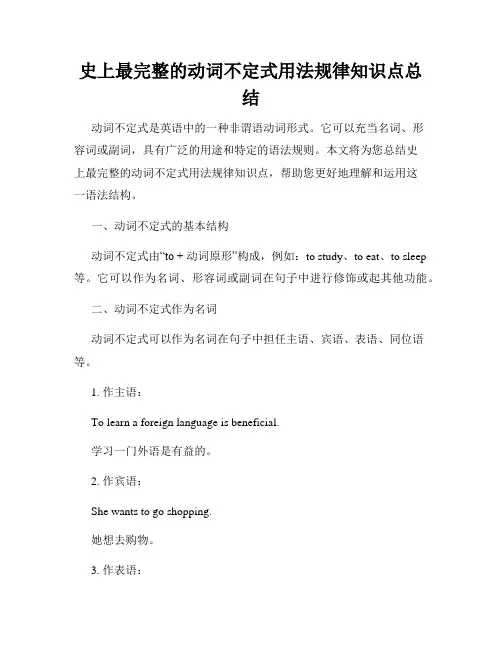
史上最完整的动词不定式用法规律知识点总结动词不定式是英语中的一种非谓语动词形式。
它可以充当名词、形容词或副词,具有广泛的用途和特定的语法规则。
本文将为您总结史上最完整的动词不定式用法规律知识点,帮助您更好地理解和运用这一语法结构。
一、动词不定式的基本结构动词不定式由“to + 动词原形”构成,例如:to study、to eat、to sleep 等。
它可以作为名词、形容词或副词在句子中进行修饰或起其他功能。
二、动词不定式作为名词动词不定式可以作为名词在句子中担任主语、宾语、表语、同位语等。
1. 作主语:To learn a foreign language is beneficial.学习一门外语是有益的。
2. 作宾语:She wants to go shopping.她想去购物。
3. 作表语:His dream is to become a doctor.他的梦想是成为一名医生。
4. 作同位语:His goal, to win the championship, motivates him to practice every day.为了赢得冠军,他每天都在努力。
三、动词不定式作为形容词动词不定式可以作为形容词修饰名词,通常在名词之前。
1. 修饰名词:I have a book to read.我有一本要读的书。
2. 修饰人:She is the person to ask for help.她是可以求助的人。
四、动词不定式作为副词动词不定式可以作为副词修饰动词、形容词或副词,表示目的、结果、原因等。
1. 修饰动词:He bought a new computer to play games.他买了一台新电脑来玩游戏。
2. 修饰形容词:She is too tired to continue working.她太累了,无法继续工作。
3. 修饰副词:He speaks English fluently enough to communicate with foreigners.他的英语说得足够流利,可以与外国人交流。
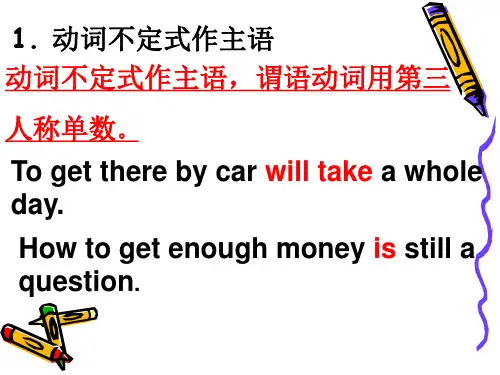
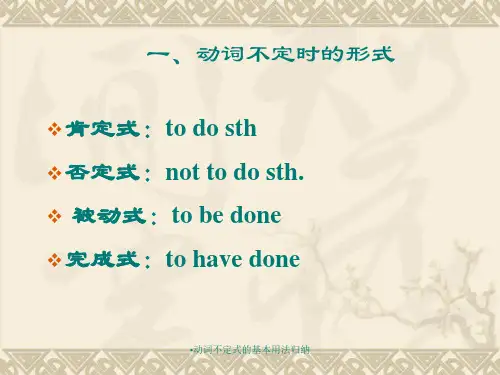
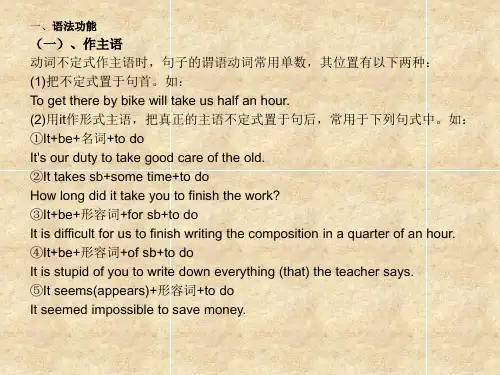
动词不定式的用法总结动词不定式是英语中一种常见的非谓语动词形式,由动词原形加上“to”构成。
它具有多种用法和功能,在句子中可以扮演多种角色。
下面将对动词不定式的用法进行总结和分析。
一、作主语动词不定式可以作为句子的主语,通常位于句首,帮助构成句子的基本结构。
例如:- To learn is to grow. - To study is important for success.二、作宾语动词不定式可以作为动词的宾语,跟在及物动词之后。
例如:- She wants to dance all night. - They decided to go on a trip.三、作介词宾语动词不定式还可以作为介词的宾语,通常介词后面要跟动词的-ing形式,但在某些情况下,使用动词不定式更为恰当。
例如:- She is afraid to speak in public. (介词“in”后接动词不定式) - He is capable of solving difficult problems. (介词“of”后接动词不定式)四、作定语动词不定式可以作为名词的定语,修饰名词。
例如:- I have some books to read. - This is a place to visit.五、作表语动词不定式有时也可以作为句子的表语,描述主语的身份或状态。
例如:- His goal is to become a doctor. - The key is to be patient.六、作宾补动词不定式可以作为宾语的补语,表示对宾语的补充说明。
例如:- She considers him to be her best friend. - They found the task to be challenging.七、作状语动词不定式还可以作为状语,修饰动词或整个句子,表示目的、原因、结果等。
例如:- She works hard to achieve her goals. (目的) - He left early to catch the train. (目的) - He stayed up late to finish his project. (目的) - He left the room, only to return a few moments later. (结果)动词不定式的用法多样灵活,在句子中起着重要的作用。
动词不定式用法归纳动词不定式没有人称和数的变化,在句中不能独立作谓语。
但动词不定式具有名词、形容词和副词特征,在句中可以作主语、宾语、宾语补足语、定语、表语和状语等多种成分。
另外,动词不定式具有动词特点,可以有自己的宾语和状语,组成动词不定式短语。
动词不定式的肯定形式是to+do;其否定形式是not to+do。
1.作主语可以直接作主语。
如: To see is to believe.但在英语中,常用it作形式主语,真正的主语即动词不定式放在后面。
如:It's wrong to play tricks on other people.It's our duty to keep our environment clean and tidy.(Lesson 10).点击规律:动词不定式在句中作主语时,常放在It is +adj.(形容词)+to do sth.或It is +n.(名词)+to do sth.句型中,it仅作形式主语。
2.作宾语a.以下动词只能to do 作宾语。
attempt企图 enable能够 neglect忽视 afford负担得起 demand要求 long渴望 arrange 安排 mean意欲,打算 begin开始 expect期望 appear似乎,显得 determine决定manage设法 cease停止 hate憎恨,厌恶 pretend假装 ask问 need需要 agree同意 desire愿望 love爱 swear宣誓 volunteer志愿 wish希望 bear承受 endeavor努力 offer提供 beg请求 fail不能 plan计划 bother扰乱;烦恼 forget忘记 prefer喜欢,宁愿 care关心,喜欢 happen碰巧 prepare准备 decide决定 learn学习 regret抱歉,遗憾choose选择 hesitate犹豫 profess表明 claim要求 hope希望 promise承诺,允许 start开始 undertake承接 want想要 intend想要 refuse拒绝 decide决定 learn学习 contrive设法,图谋 incline有…倾向 propose提议 seek找,寻觅 try试图b.love,like ,begin,start,hate ,prefer等词后面可以接不定式。
动词不定式用法归纳全动词不定式这玩意儿,在英语学习里可算是个“常客”啦!今天咱们就来好好把它的用法捋一捋。
先来说说啥是动词不定式。
简单说,就是“to +动词原形”的形式,比如“to do”“to play”“to study”等等。
动词不定式在句子里的角色那可多了去了。
它能当主语,比如说“To learn English well is not easy” (学好英语不容易。
)这时候,它就像个带头的老大,引领着整个句子的意思。
当宾语的时候也不含糊,像“I want to go shopping” (我想去购物。
)“want”后面跟着的“to go shopping”就是宾语,表达了我心里想做的事儿。
还有当定语的时候,比如“There is nothing to worry about” (没什么可担心的。
)“to worry about”就是用来修饰“nothing”的。
当状语的时候呢,就像“He got up early to catch the first bus” (他早起是为了赶上第一班公交车。
)这里的“to catch the first bus”就是说明了他早起的目的。
再给您说个我教学时候的事儿。
有一次上课,我讲到动词不定式当宾语补足语的用法,就举了个例子“Tell him not to play in the street”(告诉他别在街上玩。
)然后我问同学们懂了没,结果有个小调皮眨着眼睛问我:“老师,那要是他非要在街上玩咋办?”全班哄堂大笑,我也乐了,然后耐心地跟他解释:“那可不行,这不仅危险,还不符合语法规则呀!”从那以后,这个知识点同学们记得特别牢。
咱们继续说,动词不定式还有一些固定的搭配和句型,像“It's +adj + for/of sb to do sth” (对某人来说做某事是……的)“tooto” (太……而不能……)等等。
比如说“It's kind of you to help me” (你帮助我真是太好了。
动词不定式的用法小结动词不定式是英语语法中的一个重要部分,它具有多种用法,灵活多样。
接下来,让我们详细了解一下动词不定式的常见用法。
一、作主语动词不定式作主语时,通常表示具体的、一次性的或将来的动作。
例如:“To learn a foreign language well is not easy”(学好一门外语不容易。
)此时,为了避免句子头重脚轻,常用 it 作形式主语,而将真正的主语动词不定式后置,如:“It is not easy to learn a foreign language well”二、作宾语1、有些动词后只能接动词不定式作宾语,常见的这类动词有:agree(同意),decide(决定),hope(希望),manage(设法),pretend(假装),plan(计划),want(想要),wish(希望)等。
例如:“I decided to go shopping this afternoon”(我决定今天下午去购物。
)2、动词+疑问词+动词不定式。
常见的动词有:know(知道),learn(学习),show(展示),wonder(想知道),understand(理解)等。
例如:“I don't know what to do next”(我不知道接下来做什么。
)三、作宾语补足语1、一些动词如 ask(要求),tell(告诉),want(想要),wish (希望),teach(教),allow(允许)等后面常接带 to 的动词不定式作宾语补足语。
例如:“My mother asks me to clean my room every day”(我妈妈要求我每天打扫房间。
)2、使役动词 let(让),make(使),have(使,让)以及感官动词 see(看见),hear(听见),feel(感觉),watch(观看),notice (注意)等后面接不带 to 的动词不定式作宾语补足语。
最全面英语动词不定式的用法归纳整理总结英语动词不定式的用法有以下几种:1.作为动词的宾语:- I want to go to the store.(不定式作为动词go的宾语)- He likes to play tennis.(不定式作为动词play的宾语)2.作为形容词的补语:- She is excited to see her friends.(不定式作为形容词excited的补语)- He seems to be a nice person.(不定式作为形容词nice的补语)3.作为介词的宾语:- She apologized for being late.(不定式作为介词for的宾语)- They are interested in learning Chinese.(不定式作为介词in的宾语)4.作为状语:- I work hard to improve my English.(不定式作为状语表目的)- They went to the park to play basketball.(不定式作为状语表目的)5.作为主语:- To study is important for success.(不定式作为主语)- To be or not to be, that is the question.(不定式作为主语)6.作为条件状语从句的口述形式:7.作为动词的补语:- They considered him to be the best candidate.(不定式作为动词consider的补语)- We elected her to be the team captain.(不定式作为动词elect的补语)8.作为状语从句的口述形式:- He woke up early in order to catch the train.(不定式作为状语从句的口述形式)9.作为表语:需要注意的是,不定式的肯定形式一般由to加动词原形构成,否定形式则在to后面加not构成。
动词不定式的用法总结动词不定式是英语中的重要语法结构,用来表示目的、目标、意图、能力、意愿等。
在句子中可以作为主语、宾语、表语、同位语等,具有广泛的用途和灵活的运用方式。
本文将从多个角度综合总结动词不定式的用法。
1. 目的与目标动词不定式常用于表示目的或目标,说明主要动作的意图或目的。
例如:- I study hard to pass the exam.(为了通过考试,我努力学习。
)- He went to the supermarket to buy some groceries.(他去超市买些杂货。
)2. 能力与能够动词不定式可以表示能力与能够的意思,说明某人具备完成某项任务或具备某种技能的能力。
例如:- She can dance ballet.(她会跳芭蕾舞。
)- They are able to solve complicated math problems.(他们能够解决复杂的数学题。
)3. 意愿与愿望动词不定式在表示意愿和愿望时非常常见,表达某个人的愿望或意图。
例如:- I want to travel around the world.(我想要环游世界。
)- She hopes to become a doctor in the future.(她希望将来成为一名医生。
)4. 建议与命令动词不定式也可以用来表示建议或命令,表明某个人想要别人采取某种行动或者完成某个任务。
例如:- He told me to go home early.(他告诉我要早点回家。
)- The teacher asked them to finish their homework before class.(老师要求他们在课前完成作业。
)5. 尽力与努力动词不定式经常用来表示尽力、努力去做某事,强调主语付出的努力。
例如:- I tried my best to solve the puzzle.(我尽力解决这个谜题。
动词不定式用法动词不定式没有人称和数的变化,在句中不能独立作谓语。
但动词不定式具有名词、形容词和副词特征,在句中可以作主语、宾语、宾语补足语、定语、表语和状语等多种成分。
另外,动词不定式具有动词特点,可以有自己的宾语和状语,组成动词不定式短语。
动词不定式的肯定形式是to+do;其否定形式是not to+do。
下面以动词不定式在句中的作用来予以详细说明。
1.作主语可以直接作主语。
如:To see is to believe.但在英语中,常用it作形式主语,真正的主语即动词不定式放在后面。
如:It's wrong to play tricks on other people.It's our duty to keep our environment clean and tidy.点击规律:动词不定式在句中作主语时,常放在It is +adj.(形容词)+to do sth.或It is +n.(名词)+to do sth.句型中,it仅作形式主语。
2.作宾语a.want,decide ,agree等动词后面跟并且只能跟不定式。
如:We agreed to start early.She wants to be a doctor.b.love,like ,begin,start,hate ,prefer等词后面可以接不定式。
点击规律:上述动词后面除接不定式外,还可以接动名词,意思无很大区别。
提示板:like doing指经常性动作,而like to do指一次性的动作。
如:I like swimming,but I don't like to swim now.我喜欢游泳,但我现在不想游。
c.stop,forget,remember,go on ,try等词或短语后面可以接不定式。
点击规律:上述动词后面接不定式和接动名词意思大不相同。
提示板:1)stop to do sth.:停止一件事,去做另一件事。
stop doing sth.:停止正在做的事。
例句:When the teacher came in,the students stopped talking;when he came out,the students stopped to talk.当老师走进来时,学生们停止说话;当老师走出去时,学生们又开始说话。
2)思考:forget,remember,go on,try等词或短语后面接不定式和动名词用法有何区别?d.在find/feel+it+adj.+to do sth.句型中,it是形式宾语,真正的宾语是后面的动词不定式。
如:The man downstairs found it difficult to get to sleep.I feel it easy to recite the text.点击规律:某些动词或短语后面既可以接动词不定式作宾语,又可接动名词作宾语,二者用法上的区别可以通过造句子加以区分,如上面stop例句。
3.作宾语补足语a.tell,ask,want,order,teach,invite,warn,wish,help,get,wish,help等词后面常接不定式作宾补。
如:I tell him not to go there by bus .Edison's mother taught him to read and write.b.let,make,have,see,hear,feel,watch,notice后面接不带to的不定式作宾补。
如:The boss makes them work 16 hours a day.I heard her sing in the next room.提示板:若变成被动语态,在上述结构中,不定式符号to要加上。
如:They are made to work 16 hours a day by the boss.She was heard to sing in the next room.4.作定语:放在被修饰的名词、代词后面例句:I have a lot of work to do.The doctor said he could do nothing to help the boy.点击规律:动词不定式若在句中作定语,常放在被修饰的名词、代词之后。
提示板:如果动词不定式和前面所修饰的词构成动宾关系,若动词是不及物动词,切记不要忘掉介词。
如:I have a small bedroom to live in.Have you got some pens to write with?5.表语:放在连系动词be后面例句:His wish is to become a scientist.The first important thing is to save the soldiers' lives.当务之急是抢救战士们的生命。
点击规律:动词不定式在句中作表语时,通常对连系动词前面的名词进行诠释说明。
6.作状语a.目的状语:放在go,come,use,live,in order等词后面。
如:I come to see you.He runs fast in order to get there in time.b.原因状语:放在sorry,glad,surprised,disappointed,excited等词后面。
如:I am glad to see you here.I am sorry to trouble you.c.作结果状语。
如:Some of the apples are hard to reach.The room is large enough to hold 1000 people.7.与what,who,whose,when,where,how等疑问词连用,作宾语、宾语补足语、主语等。
如:I don't know what to do next.(宾语)He taught us how to use the computer.(宾语补足语)It's still a question how to get there.(主语)【模拟试题】(答题时间:30分钟)一. 选择填空:1. He asked me ________ here earlier.A. comeB. to comeC. comingD. came2. Please tell him _______ on the wall.A. don’t drawB. to not drawC. not to drawD. not draw3. He wanted ________ a cup of tea.A. to haveB. havingC. haveD. had4. I’d like ________ a word with you.A. hadB. havingC. to haveD. have5. I came here _______ my uncle.A. sawB. to seeC. seeingD. to be seen6. The man refused (拒绝)________ back his words.A. to takeB. takingC. tookD. takes7. I can let you ________ one ticket.A. to haveB. haveC. havingD. had8. We often heard him _________ in his room.A. to singB. singsC. sangD. sing9. He was made ________ day and night.A. workB. workingC. to workD. worked10. He stopped ______ a look, but saw nothing.A. havingB. to haveC. haveD. had11. My father was too angry _________ a word.A. to sayB. not to sayC. to sayingD. didn’t say12. My brother was old enough ________ to school.A. wentB. goesC. goingD. to go13. It is time ________ him ________ supper.A. of, to haveB. for, to haveC. of, havingD. for, to has14. It’s very kind _______ you ______ me.A. of, to helpB. for, to helpC. of, helpD. of, helping15. It’s important _________ our classroom clean every day.A. keptB. to keepC. to giveD. keep16. Before liberation (解放)they had no chance _______ to school.A. wentB. goC. to goD. to be gone17. He said he had an important meeting ________.A. attendB. would attendC. attendingD. to attend18. Please give me a piece of paper ________.A. to writeB. to write onC. writingD. to write it19. I don’t know _______.A. what doB. what will doC. what to doD. do what20. Your radio needs ________.A. to be repairedB. to repairC. repairedD. to repairing21. My wish is ________ a teacher.A. becomingB. to becomeC. becomeD. became22. I want ________ him a letter now.A. to writeB. not writeC. writeD. wrote23. It took us three days _________ the trees.A. plantB. plantedC. to plantD. plants24. Why not ________ here _______ me?A. to come, to seeB. come, to seeC. came, seeingD. come, see25. He wishes me ______ my best _________ hard at English.A. to do, to workB. doing, workingC. to do, workingD. do, work26. Please tell me ________ her. I have something _______ her.A. where to find, tellingB. where to find, to tellC. where can find, to tellD. where finding, telling27. How happy they are ______ each other again!A. to seeB. seeC. sawD. being seen28. They decided (决心)_______ a letter ______ their thanks.A. to write, expressing(表达)B. writing, expressC. write, expressedD. to write, to express29. The officer ordered (命令)him _______ down _________ a rest.A. lying, haveB. to lie, to haveC. to lie, havingD. lie, had30. The headmaster called on (号召)us ______ hard for our country.A. to workB. workedC. workD. to working二. 根据上句意思完成下句,使两句意思相近或相同,每空一词。